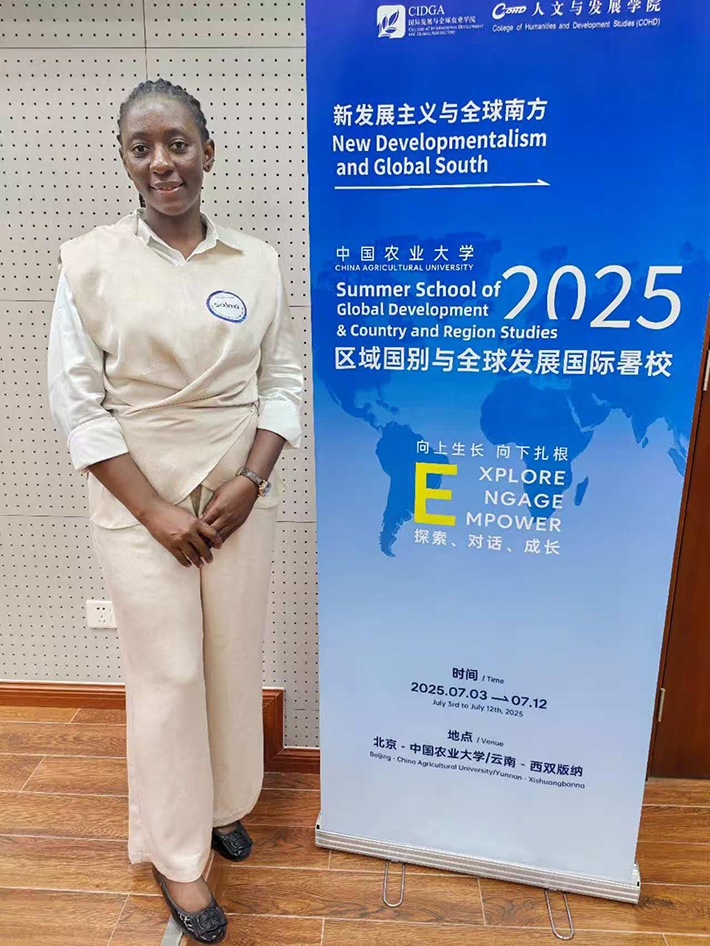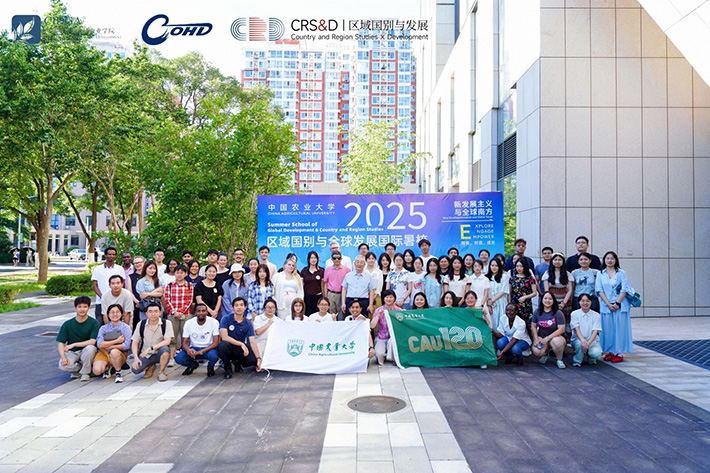|
||||||||||
| Home Top News Economy/Tech Culture/Sports China in Foreign Eyes Green Development Videos Intangible Cultural Heritages |
|
||||||||||
| Home Top News Economy/Tech Culture/Sports China in Foreign Eyes Green Development Videos Intangible Cultural Heritages |
| ChinAfrica |
| From Aid to Agency |
| China’s rural revitalisation shows that sustainable development grows from local agency, strong institutions and thoughtful policy - not from external assistance |
| By Fatmata Salma Kargbo | VOL. 17 October 2025 ·2025-10-10 |

The Summer School of Global Development & Country and Region Studies at China Agricultural University brought together scholars, students and practitioners in development from all corners of the globe to critically examine the complexities of development from an interdisciplinary perspective. The programme comprised a mix of theoretical and practical educational activities that enhanced my understanding of global development, South-South cooperation, and China’s growing involvement in global affairs.
Each activity helped me to understand the changing global context and the imperative of interdisciplinary, inclusive approaches to development. It was an honour to participate and explore these dynamics through lectures, exchanges, and community engagement. As a Sierra Leonean development student studying in China, I found that there were many lessons for my country.
Rethinking development
The keynote by Li Xiaoyun, chair professor and honorary dean of the College of International Development and Global Agriculture at CAU, was particularly striking as it deeply resonated with me. His lecture addressed the structural nature of poverty, emphasising that development is not merely about distributing funds or constructing infrastructure, but requires confronting political failures, institutional weaknesses, and cultural barriers that sustain inequality. Using Nairobi as an allegory, where aid organisations and slums seemingly happily coexist, he highlighted the contradictions and hypocrisy inherent in the global development endeavour. The fact that slum areas have persisted around development projects suggests an increasing possibility that aid does not alleviate poverty but sustains the poverty economy. In many countries in Africa, donor-led development has only had a modest effect.
By centring local agency, the summer school highlighted a new approach to development. Professors Maia Green, Nikita Sud and Laura Hammond noted that sustainable development cannot rest on universal blueprints like the SDGs, which risk becoming box-ticking exercises. Instead, it must emerge through co-created, context-sensitive strategies grounded in local knowledge, lived experience, and diverse worldviews.
China’s rural transformation exemplifies an agency-driven approach to development. According to Professor Tang Lixia, professor and deputy dean of the College of Humanities and Development Studies at CAU, instead of relying on foreign aid, China created an integrated framework combining incentives, infrastructure, and public services with the cultivation of local agency. A distinctive feature has been the action-research model, where professors and students work alongside villagers to train entrepreneurs, foster community enterprises, and ensure rural voices are heard in policymaking.
Our visit to Xishuangbanna in Yunnan Province offered a clear view of agency-driven rural transformation in action. Through support from Professor Li’s programme and CAU, the community built a thriving agro-tourism economy, attracting more than 6,000 visitors over the Spring Festival holiday. This brought real earnings to villagers, not through aid handouts but through strengthening local skills and livelihoods. What makes this success compelling is its foundation in what matters most to local people: community ownership, local governance, and cultural pride.
Lectures at the summer school highlighted the decline of neoliberal development orthodoxy. The retreat of USAID and Washington’s rejection of the SDGs were seen as a major geopolitical shift, while migration was framed not as a crisis but as a livelihood strategy. These insights underscore the need for new development metrics - resilience and capability - rather than GDP or aid. China’s rural governance model, grounded in community decision-making and village enterprises, embodies this alternative, aligning with South–South cooperation based on knowledge sharing and partnership.

Significance for Sierra Leone
For Sierra Leone, China’s rural revitalisation presents a practical blueprint for shifting away from aid dependency towards community-driven development. Despite its cultural diversity, ecological wealth and agricultural potential, rural Sierra Leone has been constrained by externally imposed projects. A more sustainable path lies in collaborative partnerships with institutions like Njala and Makeni that could support practical, community-focused training for young entrepreneurs. Drawing on lessons from China’s rural revitalisation, Sierra Leone could leverage agro-tourism and cultural assets to diversify livelihoods.
The main challenge is moving from dependency towards locally defined, inclusive development that unlocks community agency and innovation. Universities and research institutions in Sierra Leone must take part directly in rural transformation, embedding student-led research, entrepreneurial training, and community outreach into their curricula to enhance both academic relevance and people’s livelihoods.
Moreover, development initiatives must employ a SMART framework - specific, measurable, attainable, realistic, and time-bound - with clear targets for crop yields, income, market access, and active participation from women and youth.
In short, China’s rural revitalisation shows that sustainable development grows from local agency, strong institutions and thoughtful policy - not from aid. Sierra Leone has an opportunity to apply these lessons in creating a plan that empowers communities, mobilises local resources, and encourages innovation. Development is no longer about external solutions; it is about dignity, collaboration, and collective ownership of change.
I am grateful to China Agricultural University for the opportunities to learn across different platforms. As the school marks its 120th anniversary, it continues to exemplify excellence, diligence, and dedication, nurturing some of the brightest minds globally. Its legacy of academic effort and global engagement is inspiring and has enabled me, alongside many others, to use transformative approaches to build a more sustainable, just, and equitable future.
The author is student from China Agricultural University
|
||||||||||||
| About Us | Contact Us | Advertise with Us | Subscribe |
| Copyright Beijing Review All rights reserved 京ICP备08005356号-5 京公网安备110102005860号 |